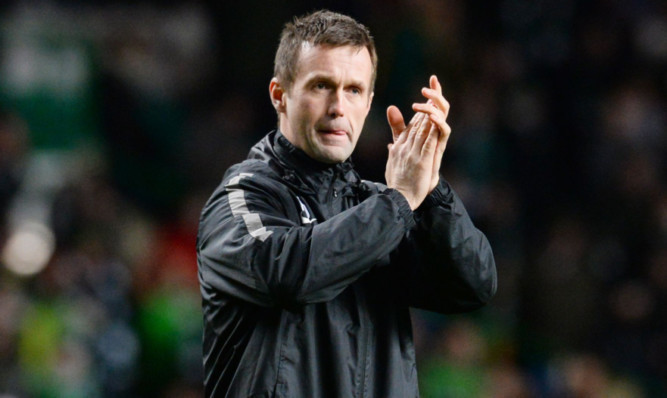
“So, when is the trophy presentation taking place then?”
Watching Celtic celebrate at the end of a night that had seen them twice come from behind to draw with Inter Milan, that was the observation of one Press Box veteran.
It was a bit churlish. The Hoops had, after all, more than contributed to what had been a terrific, high-octane spectacle.
As any fan will testify, packed stadiums and heightened expectations are no guarantee of high-quality entertainment.
Yet on this occasion the fare lived up to exceeded even the setting, with a breathless first-half delivering five goals.
At the same time, the doubter’s general point was a fair one.
Celtic, for all their efforts, for all their promise, have won nothing yet.
At a shade over evens, they are a very short price to win the domestic Treble.
Given they are already in the League Cup Final, the Scottish Cup quarter-final and on top of the Premiership, that is no great surprise.
All three targets are certainly achievable.
In order to progress in this Europa League campaign, however, they are going to have to do something they’ve never done before win a European tie in Italy.
There is, to be fair, another possibility but it is slim in the extreme. A scoring draw of 3-3 would force extra-time and please bear with me any draw from 4-4 up would put the Hoops through on away goals.
A pragmatic man, Ronny Deila will almost certainly instruct his players to focus on the more straightforward proposition.
After the first leg, Celtic’s stars, happily hyper from the night’s exertions, were bullish about their chances in the San Siro.
Gary Mackay-Steven spoke of causing Inter lots of problems, and ventured that, on a different night, they would have scored a few more still.
Given that would have taken them to around the seven or eight-goal mark, it was quite a statement.
Cut out the mistakes in the San Siro, be bold and cash in on the opportunities that may come their way and victory would be theirs.
In theory when plotted out like that anyway the task sounds simple enough.
History, though, suggests reality is likely to bite.
The last time Celtic managed to knock out a team from one of Europe’s top five England, Spain, Germany, Italy and France was in back in 2004.
Yes, they beat Barcelona at Celtic Park three years ago when Tony Watt had his moment in the sun, but that was in the group stages of the Champions League.
Barca had their colours lowered on the night, yes, but still they qualified for the knock-out stages. Outside of the qualifiers, the Hoops have won just once away from home in their last 36 away European ties.
And in this game, they are seriously outmanned in terms of finance.
The Inter team which lined up at Celtic Park on Thursday night cost £83 million. Celtic’s cost just £13 million.
That kind of money a £70 million differential talks.
So despite the feel-good factor engendered by the double comeback, the bookmakers were unimpressed by the result and pushed Deila’s men out to 9/2 against to qualify.
As even non-gamblers will appreciate, when they are only two possibilities involved, that is a big thumbs down.
So can Celtic do it?
There is a well-worn phrase better lucky than good that has been applied to the current manager more than a few times in this, his first season in charge of the Hoops.
The more that time passes, the more it looks he may be both.
The winter transfer window additions of Stuart Armstrong and Mackay-Steven have been spectacularly successful already.
Both players have settled into the side seamlessly. To watch the pair teamed up alongside Stefan Johansen in the midfield front three cause all manner of problems for Partick Thistle on their debuts was impressive.
To see them then step up to a game against top Serie A opposition, and still get plenty of joy, was striking.
It can be argued Mackay-Steven’s opportunity came about as a result of Kris Commons’ injury, but that’s part of the game.
Deila’s promotion of players he has inherited, but who were on the fringes, has also worked out well.
Nir Bitton, Stefan Johansen and, in recent months, Leigh Griffiths have all flourished under the Norwegian’s charge.
The team isn’t perfect. The young central defensive combination of Virgil van Dijk and Jason Denayer lacks experience at the top level, and it showed on Thursday night.
Not stretched in the domestic games against the likes of Partick Thistle and Kilmarnock, they can look vulnerable under pressure.
Deila himself acknowledges as much, citing the future recruitment of a “leader” for the back line as a future priority.
In the forward areas, though, Celtic are strong.
The two holding midfielders provide a great base. Bitton gets better all the time, while captain Scott Brown a restrained figure in the first leg because of his booking plays with impressive positional discipline these days.
And from there, the various combinations of Commons, Armstrong, Mackay-Steven, Griffiths, Guidetti, Stokes, Scepovic and Forrest provide pace and a serious goal threat.
Prior to Thursday night, Inter had conceded only two goals from their last eight European games. Celtic surpassed that total in just 90 minutes.
So, daunting as the trip may sound, they should have a puncher’s chance in Milan.
It will take something remarkable for them to deliver a knock-out blow but it can be done.

Enjoy the convenience of having The Sunday Post delivered as a digital ePaper straight to your smartphone, tablet or computer.
Subscribe for only £5.49 a month and enjoy all the benefits of the printed paper as a digital replica.
Subscribe